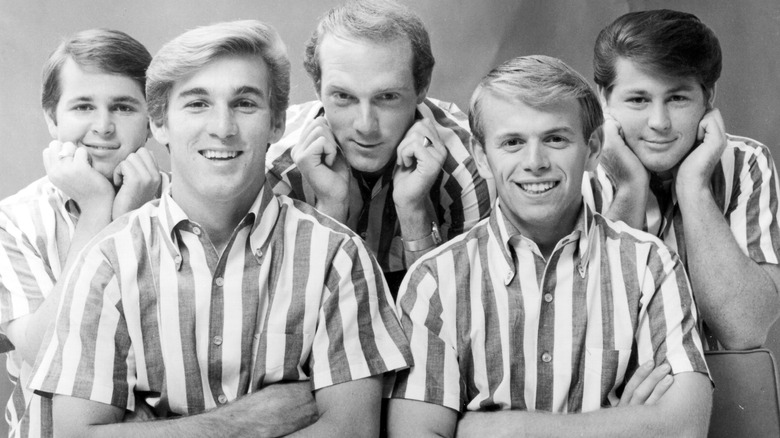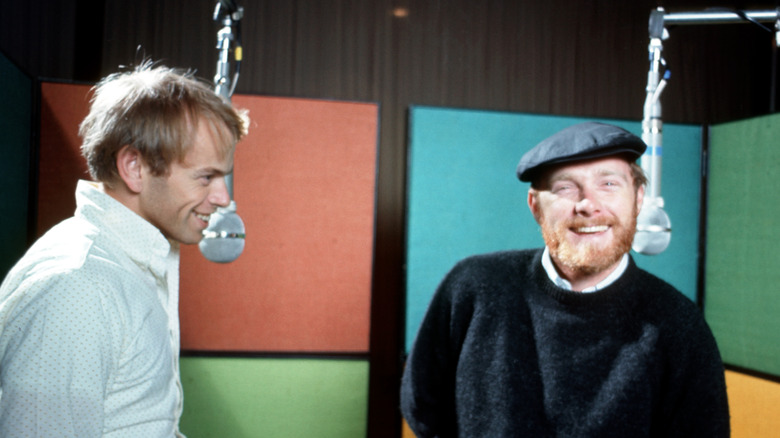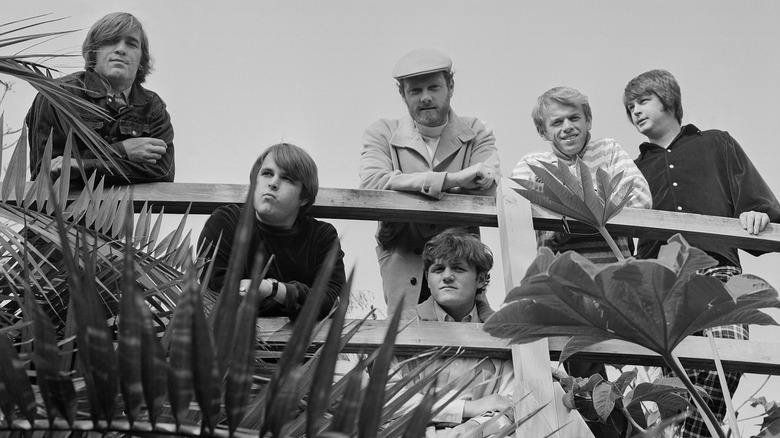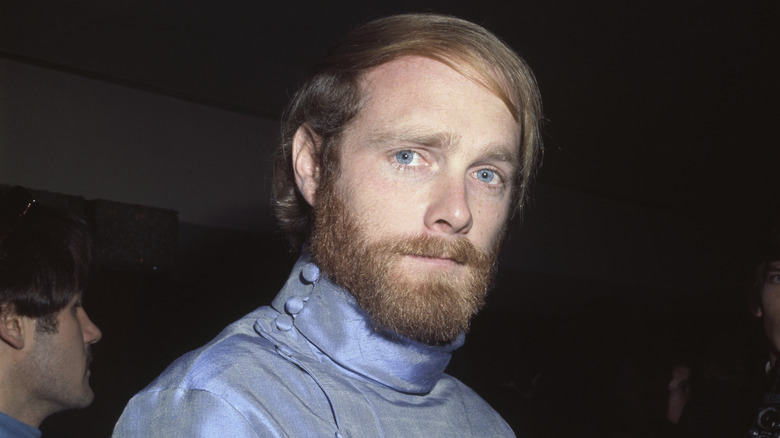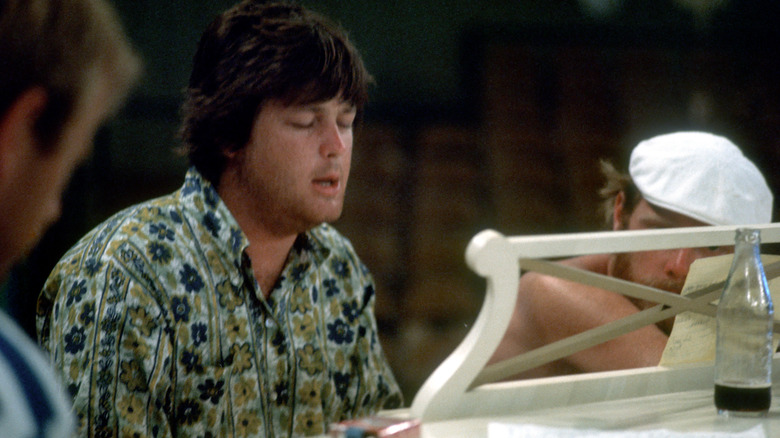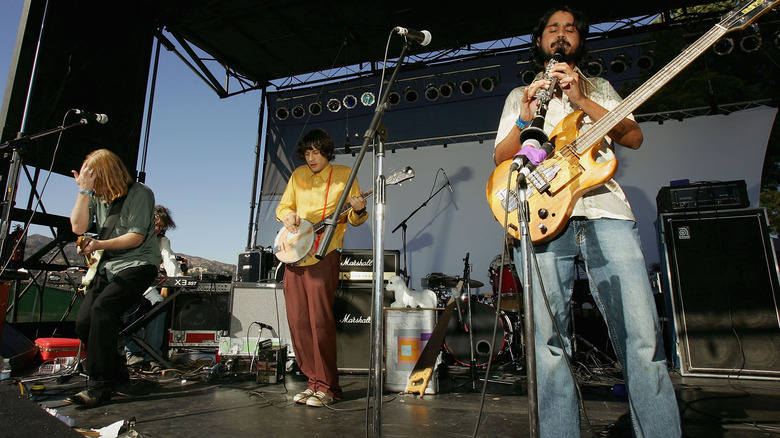The Truth About The Beach Boys Album Smiley Smile
The Beach Boys emerged in the early '60s as the quintessential American rock 'n' roll band. Drawing influences from early rock heroes like Elvis Presley and Chuck Berry, as well as vocal groups like the Four Freshmen, brothers Brian, Carl, and Dennis Wilson, their cousin Mike Love, and Brian's high school friend Al Jardine teamed up to record some of the most memorable songs in popular music history. They had a reliable hit-making formula down pat, and it served them well throughout their first few years of existence. Then, on one evening in October 1966 (via Rolling Stone), Brian Wilson announced to his dinner guests that he was working on a "teenage symphony to God."
That teenage symphony to the dude upstairs (as conceptualized by a then-24-year-old) was none other than "Smile," and it was going to be unlike anything the Beach Boys had ever recorded. Earlier in 1966, Wilson befriended an up-and-coming songwriter named Van Dyke Parks, and the two worked long and hard on the songs that were going to make up this ambitious concept album.
Unfortunately, the entire project fell apart due to a variety of reasons, and on September 18, 1967, the Beach Boys released an album with the similar-sounding title of "Smiley Smile." It was, however, a vastly different record from "Smile," and one that ultimately had major ramifications for the group's career going forward.
The album was a stripped-down version of Smile
As noted above, "Smile" was supposed to be the Beach Boys' — and specifically, Brian Wilson's — magnum opus. If Wilson messed with the formula on "Pet Sounds," he was going to completely trample it on "Smile" and fully reinvent the Beach Boys as a band that was so over singing about cars, girls, and ... the beach. Unfortunately, it would be multiple decades before the world had a much better idea of how the unfinished album was supposed to sound like — "The Smile Sessions" was released in 2011 as a box set featuring a hypothetical version of the album, as well as tons of outtakes from the recording sessions (via AllMusic). But in 1967, consumers had no choice but to settle for the stripped-down, simplified "Smiley Smile."
The popular narrative is that Wilson's declining mental health and increasing drug use were the two factors that doomed the "Smile" sessions and forced the Beach Boys to release "Smiley Smile." However, Far Out Magazine points out that there was a far bigger challenge at hand, which was distilling a good 50 hours of sound fragments into a lean, mean 12-track LP with a running time of about 30 minutes. The site opined that it was too much, too soon for a group that was best known for simple, yet gorgeous vocal harmonies, and that may have been the main factor that led to "Smile" turning into 1960s vaporware and "Smiley Smile" hitting record shelves as a downscaled version of the original project.
Smiley Smile was not a big hit, but it had two successful singles
Prior to "Smiley Smile," the Beach Boys were practically guaranteed to churn out hit albums and singles — not even the British Invasion could stop these proud Californians from charting. "Pet Sounds" marked a significant lyrical and musical change for the band, but that still reached No. 10 on the Billboard 200. "Smiley Smile" broke that trend by becoming the lowest-charting Beach Boys album at that point in their career, peaking at a middling No. 41. While one could say that was a result of how the record contained far fewer hooks than previous Beach Boys releases, the times were a-changing in 1967 — the rise of psychedelic rock and increasing prevalence of socially relevant songs on the charts meant the band was slowly falling out of favor with the record-buying public.
The lack of Billboard 200 success for "Smiley Smile" didn't mean there weren't any classic singles that did well on the charts. Still, there were some caveats. "Good Vibrations" was a No. 1 hit for the Beach Boys, but it was actually released as a single in 1966, one year before "Smiley Smile" arrived. "Heroes and Villains" reached a respectable No. 12, it was largely considered a disappointment (via Far Out Magazine). Most fans were overwhelmed by its complexity, while Jimi Hendrix was quoted as saying that the track reminded him, quite disparagingly, of a "psychedelic barbershop quartet."
Mike Love is not a fan of Smiley Smile
If there was one member of the Beach Boys who really, really wanted to stick to their increasingly dated roots as a band that sang about little deuce coupes and surfer girls, it was Mike Love. Yup, the same man who infamously told Brian Wilson not to "f*** with the formula" during the making of "Pet Sounds," as quoted by Rolling Stone and countless other publications.
It's been well-documented that Love wasn't too enchanted with "Pet Sounds," and as Ultimate Classic Rock noted, he and Van Dyke Parks were frequently at odds during the making of "Smile." But what about "Smiley Smile"? In his 2016 autobiography, "Good Vibrations: My Life as a Beach Boy," Love explained why he felt the album was a "baffling departure" for the band, starting with how they opted for a far cruder production style without any of the top session musicians or advanced recording techniques that were used in "Smile." He also mentioned that fans had very high expectations for the Beach Boys following the release of "Good Vibrations," which is why, even with that single included in the "Smiley Smile" tracklist, the album "pretty much alienated our entire market."
On the other hand, Love acknowledged in a 2014 interview with the Austin Chronicle that "Heroes and Villains" and "Wonderful," both of which were included in "Smiley Smile," were two of the more "beautiful" tracks that were first recorded during the "Smile" sessions.
Brian Wilson withdrew from the Beach Boys after Smiley Smile's failure
Among the most interesting facts about "Smiley Smile" is that it's the first Beach Boys album to feature the credit "Produced by the Beach Boys" — most of their prior releases were produced by Brian Wilson and credited accordingly. According to Album Liner Notes, Wilson came up with the idea after the "Smile" sessions were called off, suggesting that the entire band should take credit for the album's production, ostensibly to emphasize that the group was a democracy. In a way, that decision would prove to be a harbinger of things to come, as the tepid reaction to "Smiley Smile" — and "Heroes and Villains" in particular — is often cited among the factors that caused Wilson's mental health to decline as he further distanced himself from the Beach Boys' activities.
In an interview cited by Far Out Magazine, Wondermints co-founder Darian Sahanaja recalled that "Heroes and Villains" was still a sore spot for Wilson many years after the fact. "When I first met Brian, you couldn't even mention the words 'Heroes and Villains'; he'd turn around and walk away or he'd say, 'I don't want to talk about it,'" explained the musician, who also plays for Wilson's touring band.
After almost a decade of having little to no involvement with the Beach Boys, Wilson made his much-publicized return as a full-time member of the band with 1976's "15 Big Ones" (via Rolling Stone), though it would take another two decades or so (via Biography) before he was finally in a better place in terms of his mental and physical health.
Modern-day musicians and critics love Smiley Smile
"Smiley Smile" may not have been a hit with record buyers or with critics upon its 1967 release, but it has since become one of those albums that have been vindicated by the passage of time. While it was just a fraction of what Brian Wilson had been hoping for when he started work on "Smile," it was nonetheless influential to a slew of musicians, from rock legends such as Harry Nilsson and Elvis Costello to underrated neo-psychedelia acts like the Olivia Tremor Control (pictured above) and present-day indie mainstays such as Father John Misty, as detailed by the Observer.
Modern critics have also showered "Smiley Smile" with the fawning praise it didn't quite get when it was released more than five decades ago. In 2001, Pitchfork described it as a "near-masterpiece," giving it a 9.5/10 rating and positing that the album "could have been a contemporary classic" even if no one knew about the "Smile" sessions. "Group harmonies shine just as beautifully as any on 'Pet Sounds,' and although the album isn't anywhere close to the sonic revolution that [the Beatles'] 'Sgt. Pepper' had already brought, Wilson's innovative production and arrangements still bring out the best in every single track," the outlet added.
Meanwhile, AllMusic gave "Smiley Smile" a solid four-star rating out of a possible five, referring to the deep cuts as songs with "low-key psychedelic quirkiness, with abundant fine harmonies and unusual arrangements" but singling out the two big hits, "Good Vibrations" and "Heroes and Villains," as the two standout tracks.
